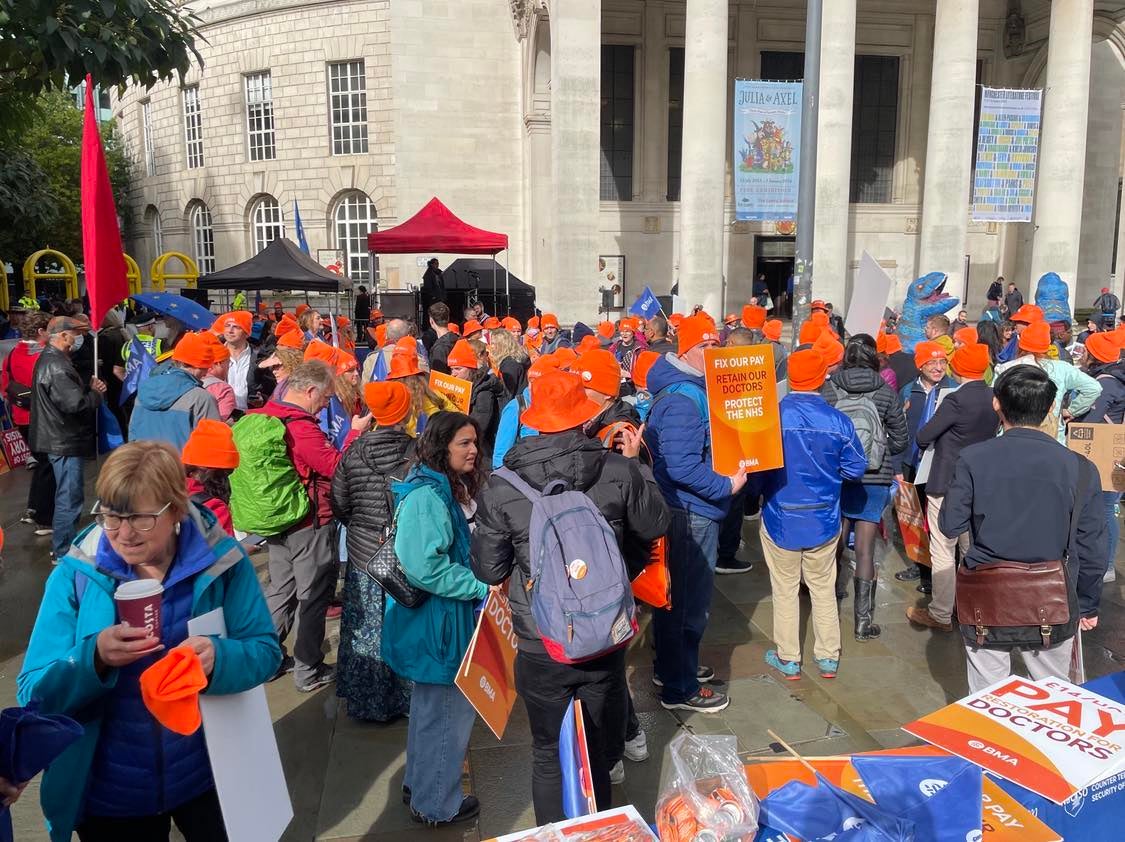
National Health Service (NHS) staff across the UK have been left in doubt after the first joint strike action in the organisation’s history did little to resolve ongoing disputes.
In the first days of October, junior doctors, consultants and general staff protested outside of the UK Conservative Party conference calling for higher pay amid fears that the organisation’s best and brightest will soon be called away to better-paying positions outside of the country.

Discover B2B Marketing That Performs
Combine business intelligence and editorial excellence to reach engaged professionals across 36 leading media platforms.
The October disruption followed a previous ten months of strikes that saw as many as 885,000 inpatient and outpatient appointments rescheduled nationwide.
Known as a “Brain Drain”, the phenomenon is a very real threat to the NHS and is liable to leave the UK’s healthcare system significantly more reliant on private healthcare companies to meet minimum service requirements.
At the same time, the UK Government has considered imposing Minimum Service Level Requirements on the NHS by way of amendment to the Strikes (Minimum Service Levels) Act of 2023. This would mean that some NHS staff could still be required to work regardless.
All of this has seemingly culminated in an incredibly volatile time for the NHS, and with winter looming over the organisation, Christmas 2023 could see one of the most stressful periods for UK public healthcare in its history.

US Tariffs are shifting - will you react or anticipate?
Don’t let policy changes catch you off guard. Stay proactive with real-time data and expert analysis.
By GlobalDataThe Conservative Party conference protests followed shortly after a call by the British Medical Association (BMA) to restore pay to levels seen between 2008 and 2009, a call that in the weeks following the joint protests, has come no closer to being acted upon.
At the time, a spokesperson for the BMA said: “With our renewed mandate, it is now time to escalate our action. This autumn, we will stand shoulder to shoulder with our consultant colleagues and take joint action for the first time in this dispute.”
Previously, Indy Kapila, an intensive care consultant in Manchester and regional consultant committee chair for the British Medical Association detailed how pay rates for junior doctors and consultants have fallen by more than 35% in real terms over the last 15 years.
At the same time, nurses across the NHS, as well as midwives in Northern Ireland also went on strike within the same period.
Now, a third group of hospital doctors in England have voted to hold an indicative ballot for strike action. The decision was made at a meeting of the Specialist, Associate Specialist and Specialty Doctors (SAS) UK committee, which had previously warned it would move forward with an indicative ballot if the Government did not produce an offer that meaningfully addressed concerns around pay.
The impact of these strikes has been particularly difficult on the day-to-day running of hospital trusts across the UK, with many having to impose measures and restrictions on service in order to manage the strikes alongside day-to-day patient care. Especially in a time in which the pressures from Covid-19 remain a concern.
Introducing the amendment to the minimum service level bill, which has yet to enter UK law, Health and Social Care Secretary and Conservative party minister, Steve Barclay detailed how he believed that the ongoing strikes would only lead to further misery for NHS staff and patients.
Barclay said: “My top priority is to protect patients and these regulations would provide a safety net for trusts and an assurance to the public that vital health services will be there when they need them.
“Doctors who started their hospital training this year are receiving a 10.3% pay increase, with the average junior doctor getting 8.8% and consultants are receiving a 6% pay rise alongside generous reforms to their pensions, which was the BMA’s number one ask.”
Whilst wages may have risen to a degree, this statement is still at direct odds with the BMA’s claims that doctors had in fact seen a real-time pay cut of 35% since the end of the 2000’s. As a result, the BMA is calling on MPs to vote against the bill amendment once it reaches the UK parliament. The government is currently seeking input from UK health industry stakeholders on the decision.
Speaking following the joint strike action this year, Richard Jennings, group chief medical officer for St George’s, Epsom and St Helier University Hospitals and Health Group Trust, detailed how the strikes present a very real challenge for the regional group.
Jennings said: “There’s been little respite this year, with several rounds of industrial action already taking place, not to mention our emergency departments becoming busier with the hotter weather. With further industrial action planned for this autumn, and winter on the way, we would expect these extreme pressures to continue for some time.”





